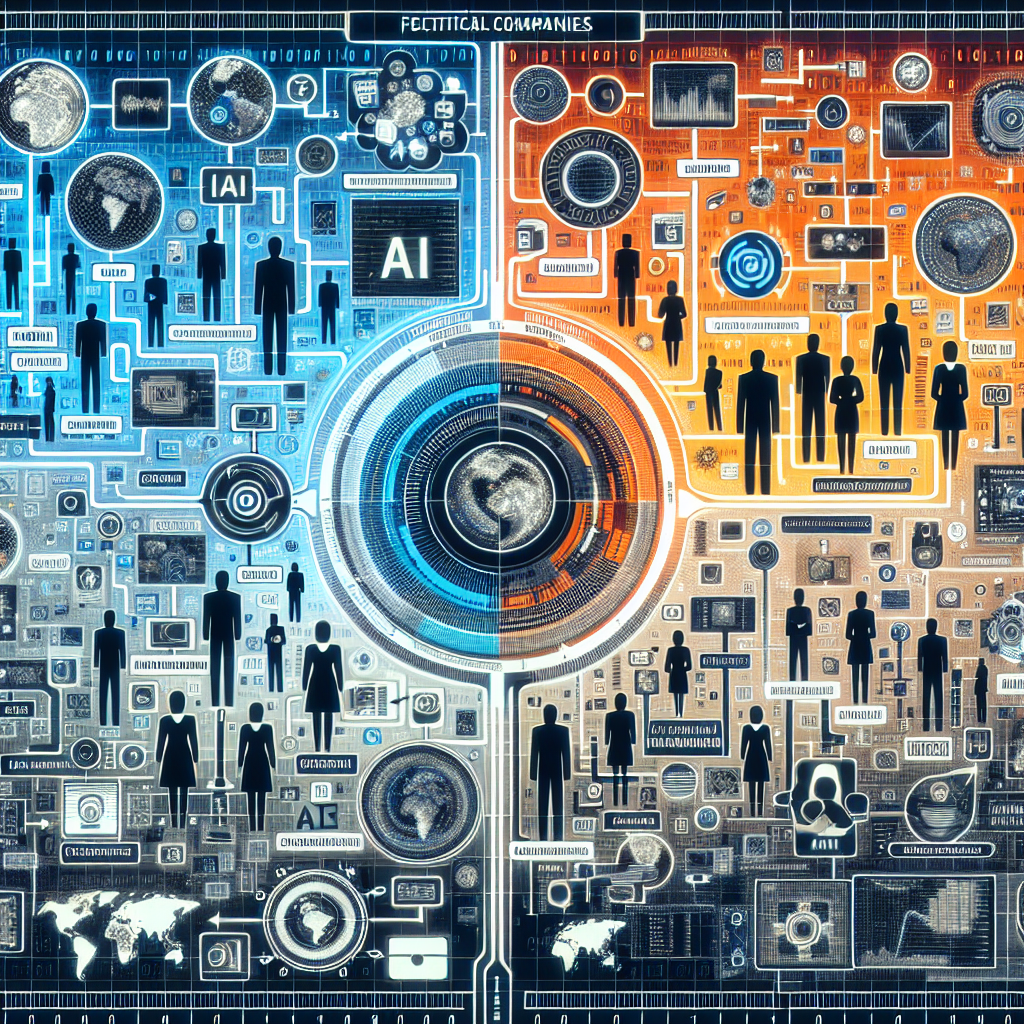
Artificial Intelligence (AI) has become a critical component in optimizing customer experience pathways, particularly in the realm of call flow design. By integrating AI solutions into call flow structures, companies can create more intelligent, adaptive communication systems that enhance customer interaction and satisfaction. This adoption of AI technology in customer service has significantly transformed traditional call flows, paving the way for a new era of advanced, customer-centric telecommunication channels.

AI-enabled call systems can analyze the customer's tone, language, and inquiry type to route the call to the best agent available, reducing waiting times and enhancing customer satisfaction. Leveraging innovative AI technologies like Chatbots and Natural Language Processing (NLP), businesses can realize more interactive, personalized, and efficient call flows.
Furthermore, AI in call flow design introduces predictive capabilities into the customer communication pathway. By analyzing past interactions and behavior patterns, AI can predict a customer's needs and streamline the interaction even before their call is answered. This predictive intelligence can minimize call durations, reduce customer frustration, and improve overall call center efficiency.
From automating routine queries to escalating complex problems to the relevant department, AI in call flow design aims to maximize customer experience pathways, making interactions customer-friendly and efficient. As AI technologies continue to evolve, the potential for further optimization in call flow design is virtually limitless.
In today's competitive business landscape, enhancing customer experience is paramount for success - and Artificial Intelligence (AI) has surfaced as a pivotal tool to maximize customer engagement pathways. In particular, AI-embedded Call Flow Design is reshaping customer service dynamics by optimizing key functionalities such as voice recognition, call routing intelligence, and predictive service capabilities.
Voice Recognition, one of the standout features, enables automated systems to understand and interact with customers using natural language. As a result, voice-enabled AI systems can provide personalized service to millions of customers simultaneously, mitigating wait times. These systems leverage advanced Natural Language Processing (NLP) and machine learning algorithms to improve speech recognition accuracy over time.
Another innovative component is Call Routing Intelligence. Traditional systems route calls based on predetermined factors like language preference or product type. However, AI systems employ data-driven strategies and predictive analytics to route calls to the best possible agent. They analyze various factors such as an agent’s past performance, customer history, and current call volume to make intelligent routing decisions. This capability both elevates customer satisfaction and increases call center efficiency.
Predictive Customer Service capabilities are another crucial aspect. AI virtual agents use previous interactions, customer profile data, and real-time analysis to make service suggestions and provide solutions even before the customer articulates their issue. For example, if a customer usually contacts the service for billing details at the end of each month, the AI might proactively provide billing detailed information at the start of the conversation. Various CRM platforms like Salesforce have integrated this innovative AI feature to personalize their service approach.
Overall, the sophisticated functionalities of AI in Call Flow Design signals a significant shift in customer service dynamics. By embracing the AI revolution, businesses can optimize their customer pathways and secure a prominent competitive edge in the market.
The rise of artificial intelligence (AI) has ushered in a new era in the landscapes of customer service and experience. Call flow design systems powered by AI can dramatically improve the efficiency of your customer interactions and data management. A critical aspect of this revolution is the seamless integration of AI call systems with CRM software, data analytics tools, and other key business management applications.

In particular, the new-age AI calls systems are designed to effortlessly sync with your existing CRM software. These integrations enable automatic updating and tracking of customer information across all touchpoints, offering 360-degree visibility to agents, and thereby optimizing customer experience pathways.
Data analytics tools similarly play a vital role in the AI call system ecosystem. By integrating these tools, businesses can gather and analyze data from thousands of customer interactions. This information is invaluable for identifying bottlenecks, assessing customer sentiment, and driving decision-making based on data-driven insights.
Furthermore, AI can also be incorporated in day-to-day business applications such as email clients, calendars, etc. These integrations can provide real-time support for inquiries, schedule meetings, or even set reminders, improving productivity, and enhancing customer service in the process.
To conclude, AI’s integration with a business's existing toolkit is dramatically redefining customer interaction pathways. Proper utilization of these integrations can help businesses offer timely and personalized service, leverage data for actionable insights, and consequently, deliver an optimized customer experience.
Artificial Intelligence (AI) has revolutionized the call center industry, offering notably improved customer experience by optimizing call flow designs. With features like Automated Speech Recognition (ASR) and Natural Language Understanding (NLU), AI provides interactions that are both efficient and contextual.
One of the crucial benefits of AI in customer interactions is a significant reduction in wait times. Instead of customers waiting on hold for a representative, AI-powered voice bots deploy Interactive Voice Response (IVR) systems that swiftly and accurately respond to customer queries. These intelligent IVR systems function round the clock, providing immediate responses to client concerns.
Beyond just speed, AI also offers personalized call responses. AI systems can be designed to recognize returning customers, recall previous interactions, and offer solutions tailored to individual customer needs. This personalization combined with the speed of response enhances the overall customer experience.
Importantly, the integration of AI into the call flow has proven to boost customer satisfaction scores. AI-powered voice bots not only resolve issues quickly but also detect customer sentiment during a conversation, allowing them to tailor responses accordingly. This deep, nuanced understanding of customer needs helps businesses build stronger relationships with customers, thereby improving customer satisfaction scores.
In conclusion, the transformation AI brings to call center operations - from lowering wait times, delivering personalized responses, to improving customer satisfaction scores - is undeniably beneficial to any organization that values customer experience. It's evident that AI is not the future of call centers – it is very much the present.
Artificial Intelligence (AI) is redefining call flow design and with it, creating optimized customer experience pathways. Across the world, industries are leveraging AI to streamline their customer service operations and automate their call flow management. In this section, we take a look at a few potent examples that strongly showcase the utility and success of AI in call flow design.

The hospitality industry has significantly benefited from AI-powered call flows. Hilton Hotels introduced "Connie," the world's first AI chatbot to aid guest communication. This innovative service bot was trained to understand the customer's needs, obtain necessary information, and swiftly direct the call to the appropriate department. This streamlined call flow design not only optimized customer experience paths but also reduced frustration by providing immediate solutions or assistance.
Another noteworthy example is from the telecommunications field. AT&T integrated AI into their Interactive Voice Responses (IVR) design to provide personalized customer experiences. The AI system, crafted to analyze speech patterns and generate appropriate responses, served to guide callers down the right pathway. By so doing, AT&T significantly reduced the average call length and boost both customer satisfaction and productivity.
In the banking sector, JPMorgan Chase turned to AI to reshape its call flow design. The bank's automated system, designed to mimic human conversational behaviors, recognizes the caller’s intent and purpose of the call and navigates them through the right path. This AI-powered strategy has reduced call handling times and tremendously increased customer satisfaction rates.
To sum up, AI showcases immense potential in reshaping call flow design to optimize customer experience pathways. With sophisticated AI technologies sophisticatedly autonomizing operations, the above-mentioned cases are just a glimpse into a future where AI revolutionizes customer service across the spectrum.
It's no secret that Artificial Intelligence (AI) is increasingly making its presence felt across a broad spectrum of industries. In customer service operations, AI's role is undergoing substantial expansion with its implementation in call flow design to optimize the pathways of customer experiences.
Call flow design is the premeditated arrangement and integration of actions, operations, and services intended to facilitate the completion of a customer call. AI can significantly boost its efficacy by using predictive analytics, machine learning algorithms, and natural language processing (NLP) to track, examine and draw insights from customer interactions. This analysis enables organizations to shape their call flows cognizantly, leading to superior customer experience pathways.
So, what future trends in AI are expected in the sphere of call flow design and management? One foreseen progression is the increased use of Automatic Speech Recognition (ASR). ASR effectively converts spoken language into written text, providing a treasure trove of data that can be harnessed to better understand customer needs.
Another trend poised to gain major traction is the integration of AI-powered virtual assistants. These digital helpers can handle a broad range of customer service operations, starting from handling basic inquiries to managing complicated service processes, all the while learning from each interaction to become more skilful over time.
Conversational AI systems like IBM's Watson Assistant and Google's Dialogflow are set to rise in prominence, bolstering natural human-like interaction between AI systems and customers. Thereby, allowing organisations to control the conversation flow and cultivate a more personalized customer experience.
In the future, AI applications in customer service operations will only grow in complexity, scope, and efficacy. Therefore, an astute understanding of these shifts on the horizon can give businesses a significant edge, improving their call flow design and optimizing their customer experience pathways.
Start your free trial for My AI Front Desk today, it takes minutes to setup!








